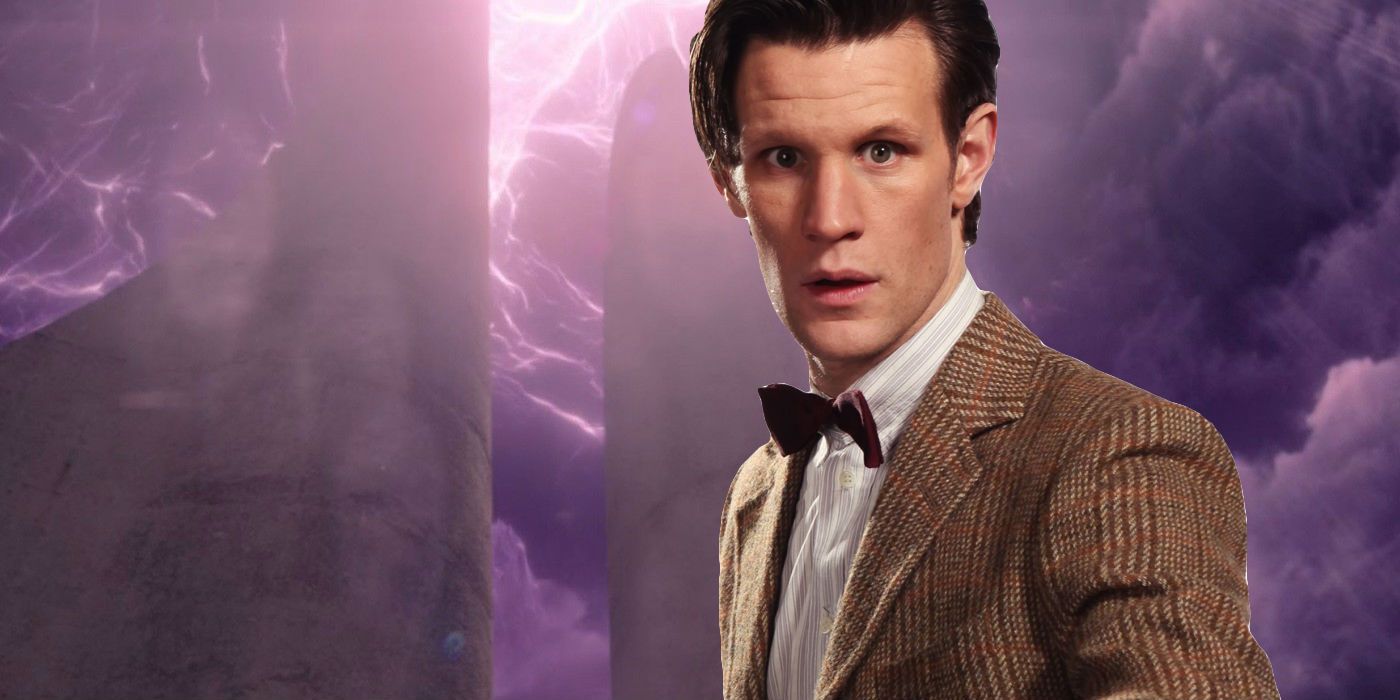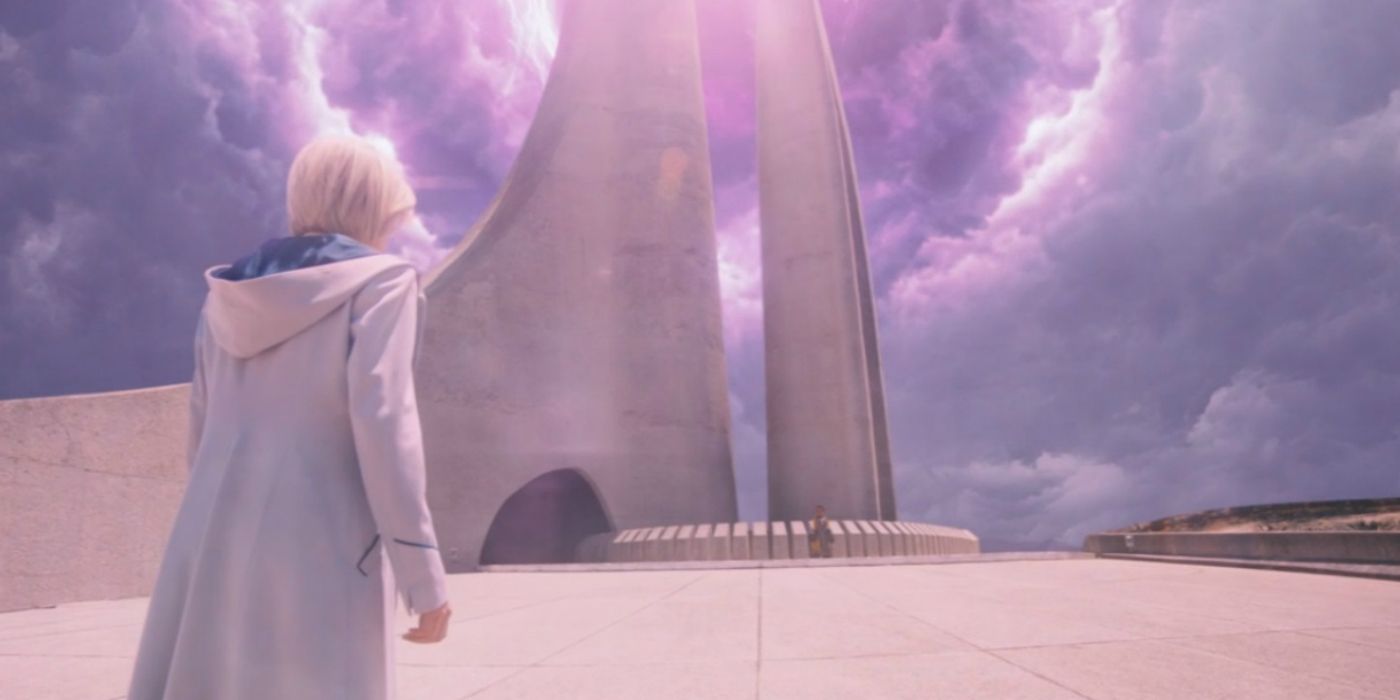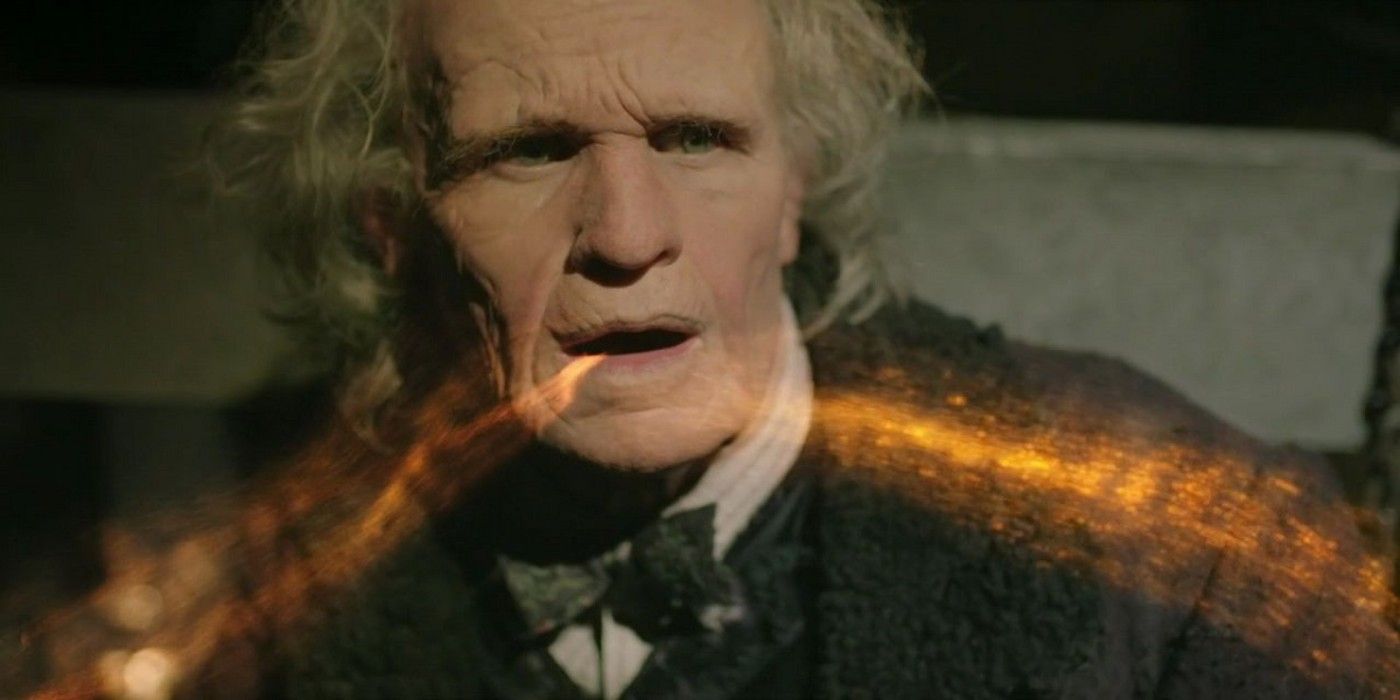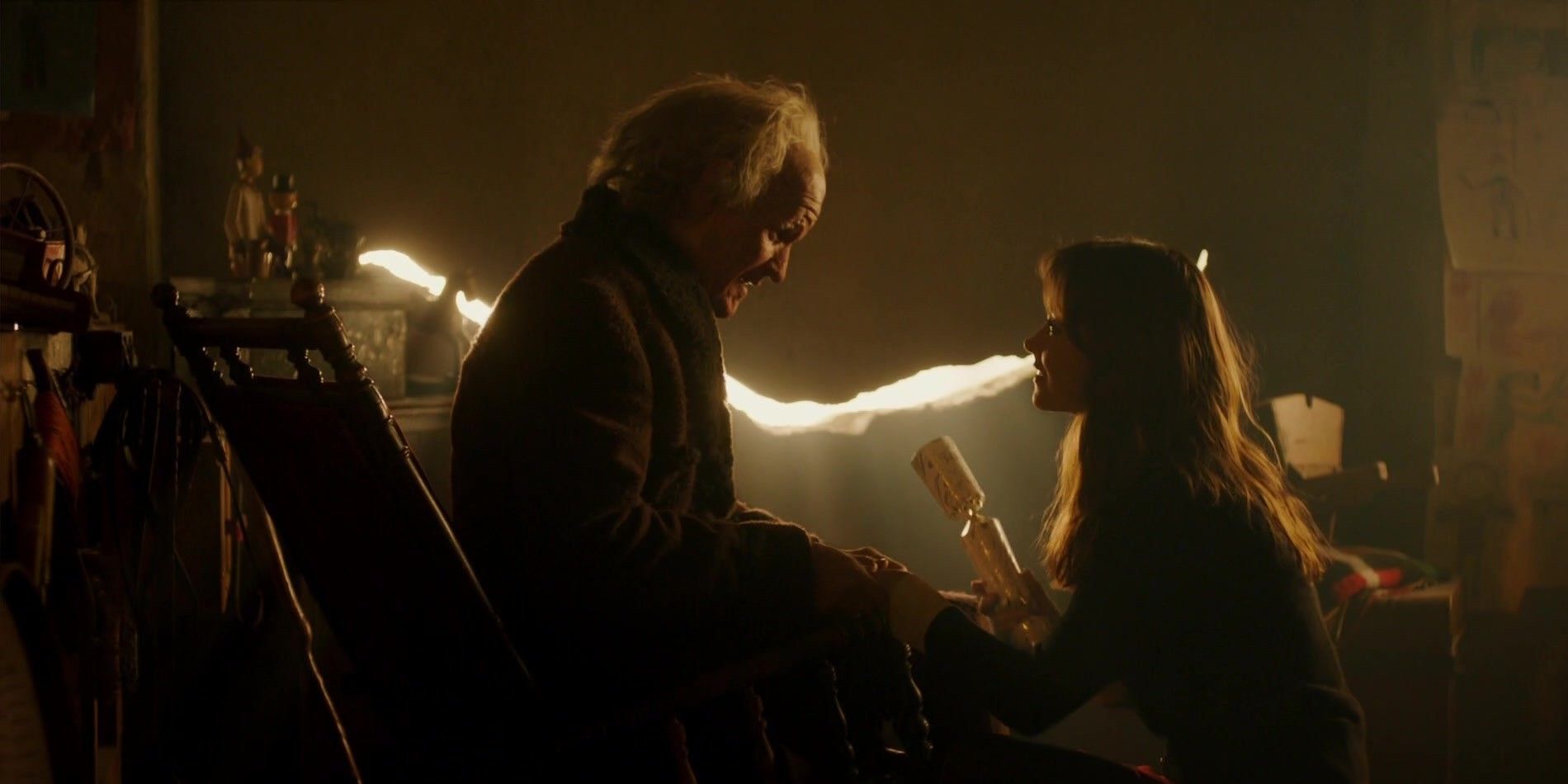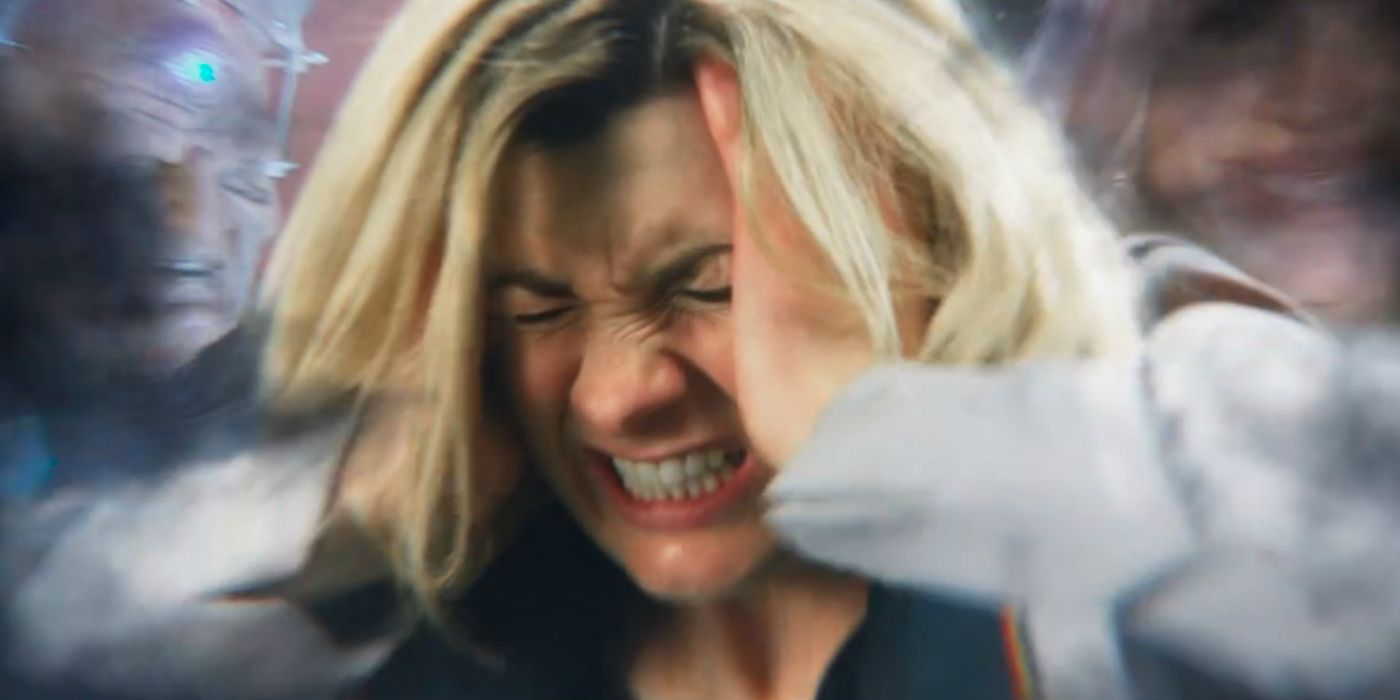Doctor Who's Timeless Child storyline has huge ramifications for Matt Smith's Eleventh Doctor. The mystery of the Timeless Child has been on Doctor Who's chessboard since season 11's "The Ghost Monument," where psychic rags called The Remnants reached into Jodie Whittaker's mind and pulled the phrase out of thin air, leading the mass speculation over Chris Chibnall's first long-term story arc. While the Timeless Child was, appropriately enough, not given any further time to develop that season, it proved the focal point of Doctor Who's recently-concluded twelfth run.
When Sacha Dhawan's new incarnation of The Master debuted in "Spyfall," he immediately brought the audience's attention back to the Timeless Child, and connected the storyline to his destruction of Gallifrey. The mystery deepened further with the introduction of Jo Martin as the Ruth Doctor - an unexplained regeneration of the famous Time Lord that neither the audience, nor the Thirteenth Doctor, had ever seen before. Season 12 was littered with more small teases, but fans would have to wait until the final episode for a proper explanation, and when answers arrived, they certainly didn't lack for impact.
The Timeless Child essentially rewrites everything we know about Doctor Who canon, or at least forces a new perspective on it. For such a sweeping change, it's perhaps to be expected that the Timeless Child doesn't fit squarely with everything that has come before. Plot holes relating to the TARDIS, River Song and Clara Oswald all arise, and The Doctor's renegade status also shifts because, as The Master puts it, she's exactly as special as she thinks she is. However, one of the biggest victims of the Timeless Child is Matt Smith's Eleventh Doctor.
What Is The Timeless Child?
The story of the Timeless Child dates back to the very edge of Gallifrey's long history, way before the planet was populated by intergalactic time-traversing snobs. A Gallifrey native by the name of Tecteun was a scientist and an explorer, and set out in a rudimentary spaceship to journey across the galaxy. During her trip, Tecteun discovered a child that had fallen through a gateway from another world and adopted the lost youngster as her own before returning home. This child was The Doctor, who soon exhibited those familiar powers of regeneration.
Curious about her child's biology, Tecteun set about experimenting on The Doctor, and was able to replicate the regeneration ability into her own people, effectively creating the Time Lords as viewers know them. After numerous regenerations, The Doctor was recruited into a shady Time Lord organization referred to as The Division, and tasked with intervening in historic matters. At the end of her service, The Doctor's mind is wiped, and she is left with no knowledge of ever being the Timeless Child or the founder of Time Lord society from another world.
How The Timeless Child Affects Matt Smith's Regeneration
The amount of regenerations a Time Lord possesses isn't exactly a clear-cut piece of Doctor Who canon, with the title character often muddying the waters by making comments about regenerating endlessly or not knowing how many bodies still remain. It's generally accepted, however, that a Time Lord can regenerate a total of 12 times, giving 13 different versions of the same being. When none of those lives remain, that Time Lord's next death will be a permanent one, except for special circumstances where the Time Lord leaders can grant a brand new cycle of regenerations and extend a Gallifreyan's life.
The Doctor himself reached the limit of his regeneration cycle a little earlier than expected in 2013. Although Matt Smith was technically only the 11th Doctor, the Tenth Doctor's aborted regeneration after being shot by a Dalek and John Hurt's banished War Doctor both counted towards the limit, making Smith the last of his run. The Eleventh Doctor decided to spend his dying days protecting the planet of Trenzalore, with his mere presence causing a stalemate between the Time Lords and a waiting reception of classic Doctor Who villains. Since Time Lords still age, Matt Smith's Doctor grew old during his noble stand on Trenzalore and drew close to death, but the words of Clara Oswald convinced the Time Lords to bestow The Doctor with a brand new regeneration cycle, allowing him to defeat the Daleks and regenerate into Peter Capaldi.
However, "The Timeless Children" confirms that the 12 regeneration limit was put in place by the Time Lords after they stole the ability from The Doctor. As the Timeless Child and the originator of regeneration, therefore, The Doctor should be able to regenerate indefinitely, or at least have a much higher limit yet to be discovered.
There are two potential explanations that allow "The Timeless Children" and "The Time of the Doctor" to coexist. The Time Lords might've pretended to give The Doctor a new regeneration cycle, but actually just killed him and triggered the next one, maintaining the pretense that their runaway dandy was subject to the same laws as the others, when in truth, he would've regenerated naturally anyway. Alternatively, it's possible that as part of the memory-wiping process, The Doctor was artificially fitted with the same 12 regeneration limit as the rest of the species.
How The Timeless Child Makes The "First Question" Worse
Aside from the regeneration issue, Doctor Who contradicts the Matt Smith era again with the "First Question." A plot thread first seeded while Russell T. Davies was showrunner in the Tenth Doctor's era, Doctor Who revealed that its hero had a birth name that only the mysterious River Song seemed to know, by virtue of having the married The Doctor sometime in her past (but his future). When Steven Moffat took over the Doctor Who reins, he continued to pull on that thread, teasing that the real name of The Doctor might just be revealed.
It later transpired that The Doctor's name was central to Matt Smith's time in the TARDIS. His enemies ominously foreshadowed that "silence will fall when the question is asked" and the "question" ultimately turned out to be the Time Lords asking for The Doctor's name as a sign that it was safe to return to the universe. If that name was spoken, the Time Lords would emerge, triggering another gargantuan war. Entire religions were formed around getting The Doctor to not reveal his name and, eventually, the moniker was left a secret, and the aura of mystery around The Doctor's birth name maintained.
Since the Timeless Child arc confirms The Doctor isn't actually from Gallifrey, the meaning of the character's real name is significantly lesser. Again, there are a couple of plausible explanations. On one hand, The Doctor's name (the one known only to River Song) could be from the character's actual planet of origin, from beyond the Boundary. This makes the mystery even more important to Doctor Who, but also removes the intrinsic connection to the Time Lords. More likely is that The Doctor had no idea what their real name was when discovered by Tecteun, and whatever her Time Lord name is, it's just something given by the inhabitants of Gallifrey. The entire notion of the "First Question" and "Silence Will Fall" means a whole let less knowing that The Doctor's "real" name was actually just another title all along.
Doctor Who Needs To Explain The Timeless Child Better
Predictably, the Timeless Child reveal has courted a mixed reception from fans, with some very excited about Doctor Who's wide-open future, and others frustrated that over 50 years of canon has just been remolded. Truthfully, a proper verdict won't become clear until Doctor Who season 13, where the full direction of the Timeless Child and its impact on The Doctor will begin to unravel. Whether Doctor Who's updated history proves a roaring success or an unmitigated disaster, however, the inconsistencies mentioned above need to be addressed - and with more than just a throwaway line admitting Doctor Who's continuity isn't watertight, as occurred in season 12's premiere.
If Chris Chibnall and co. are to make a success of rewriting The Doctor's backstory, they must first iron out some of the niggles, and the Matt Smith retcons are right at the top of that list. The regeneration plot hole especially needs to be cleared up, if not to clarify the past, then to pave the way for the future. If these points aren't addressed in Doctor Who's upcoming season, fans are unlikely to jump on board with the Timeless Child, and a new showrunner might be tempted to write the whole thing out as some kind of dastardly twisted Master plan. Alternatively, if the Timeless Child can be made to fit better alongside previous eras, it could usher in the new era of creative freshness some fans are predicting.
Doctor Who returns with "Revolution of the Daleks" this holiday season on BBC and BBC America.

